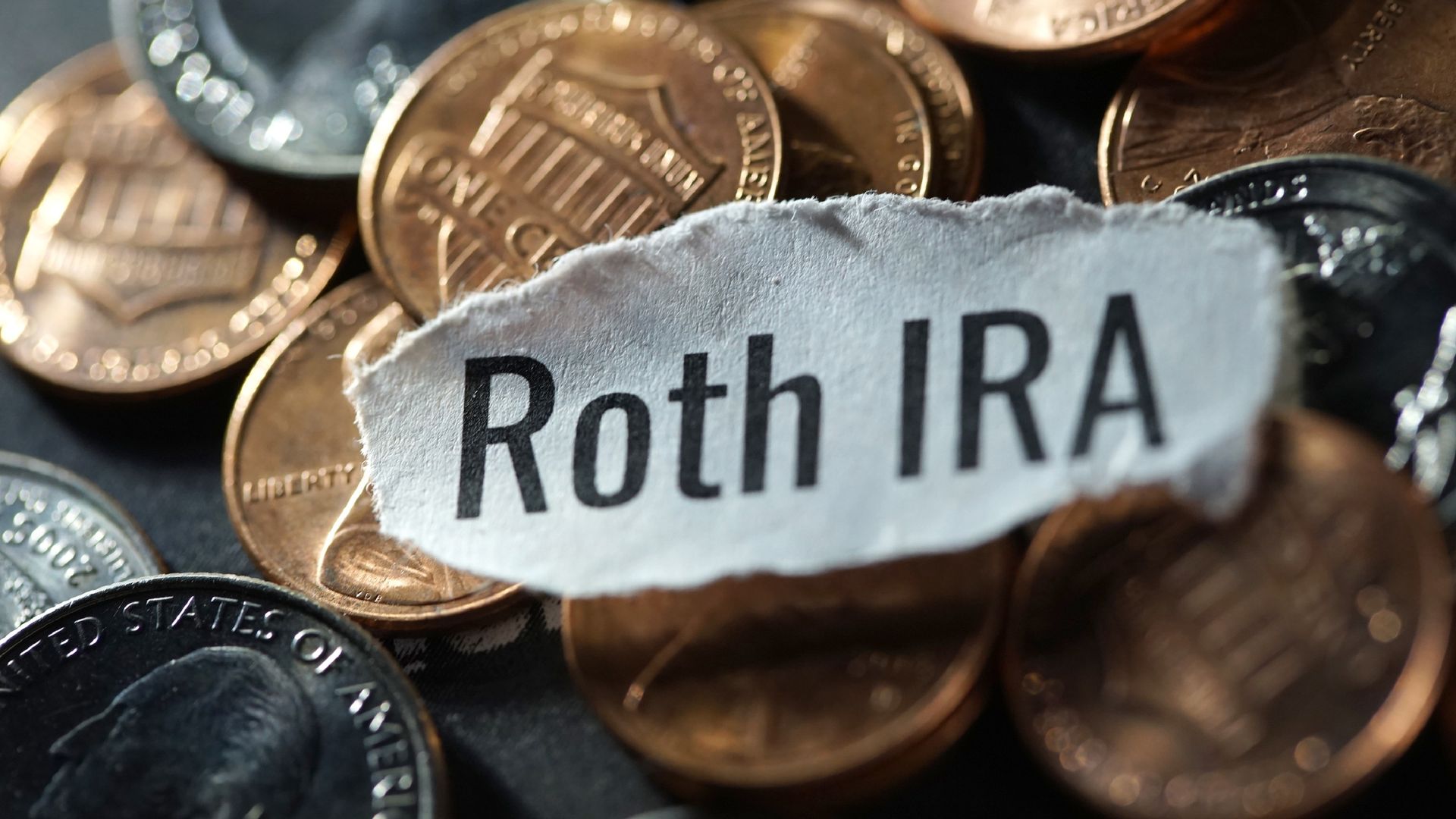Is a Roth Conversion for You? Seven Factors to Consider
The taxes you’re facing on your tax-deferred retirement savings don’t have to be so daunting. Check here to find out if you're a candidate for a Roth conversion.


So you’re retiring and possibly facing a mountain of taxes on your hard-earned nest egg. A Roth conversion can be like switching to a tax-free tunnel, but it's not for everyone. This guide outlines who should take the tunnel and not the mountain route.
Think of it like waiting until rush hour ends to pay the toll — strategic timing is key! By understanding the following factors, you can decide if a Roth conversion is for you.
1. Without a 401(k) or other tax-deferred account, it can’t happen.
Having a tax-deferred account, such as a traditional IRA, 401(k), 403(b) and more, is a fundamental element for someone considering a Roth conversion. These accounts offer benefits during your working years, allowing you to reduce your taxable income as you set aside funds for retirement. However, once you retire, the withdrawals from these accounts are taxed as ordinary income.

Sign up for Kiplinger’s Free E-Newsletters
Profit and prosper with the best of expert advice on investing, taxes, retirement, personal finance and more - straight to your e-mail.
Profit and prosper with the best of expert advice - straight to your e-mail.
A Roth conversion involves moving funds from these tax-deferred accounts into a Roth IRA, which allows for tax-free growth and withdrawals. This foresight can result in significant tax savings, especially if tax rates rise or if one's income in retirement pushes them into a similar or higher tax bracket.
2. What is your retirement tax bracket at 67? What about at age 76?
When considering a Roth conversion, it's crucial to understand your expected income tax bracket. If you anticipate being in the same or a higher tax bracket during retirement, converting to a Roth IRA could be advantageous. By paying taxes on your retirement savings at today's rates, you potentially avoid higher taxes in the future.
Analyzing your future income sources, such as pensions, Social Security, rental income or part-time work, is essential in predicting your tax bracket. You also need to consider cost-of-living adjustments (COLAs) and guaranteed vs variable income. Not all income in retirement is equal, but withdrawals from Roths at these ages are tax-free and do not affect your Social Security income or Medicare premiums.
3. Converting does cost money.
Another consideration for a Roth conversion is how you will cover the taxes due. Since converting a tax-deferred account into a tax-free Roth IRA incurs taxes on the converted amount, having funds available to pay these taxes is essential. Using money from the retirement account itself to cover the tax payment can undermine the strategy's effectiveness by reducing the balance that benefits from tax-free growth. Therefore, the ideal candidate will have separate funds set aside to handle these tax payments.
This approach maintains the integrity of the retirement savings and allows the full amount to grow tax-free in the Roth IRA. If you are in a 24% tax bracket, you would need a 31% return to get back to even, or around a 10% compounding return for three years to get back to even. This would not be ideal.
4. Timing Social Security: Why delaying makes sense.
For those approaching retirement, the timing of Social Security benefits is a key factor in the decision to execute a Roth conversion. Choosing to delay Social Security can be beneficial for several reasons. First, each year you wait increases your eventual benefits, up to age 70. Secondly, by postponing Social Security, you may have a lower income during the years you convert to a Roth, potentially reducing the tax impact of the conversion.
An ideal Roth conversion candidate would leverage this period of lower income to convert tax-deferred savings to a Roth IRA, thus taking advantage of the lower tax bracket. Additionally, by coordinating the Roth conversion with the start of Social Security, retirees can craft a more tax-efficient income stream for their later years, maximizing the benefits of their retirement savings.
5. Medicare premiums and IRMAA brackets: What you need to know.
Medicare premiums are another critical factor for those considering a Roth conversion. Specifically, the income-related monthly adjustment amount (IRMAA) can increase Medicare Part B and D premiums for retirees with higher income levels. A Roth conversion can raise your modified adjusted gross income (MAGI) and potentially push you into a higher IRMAA bracket, resulting in increased costs.
The ideal Roth conversion candidate would plan their conversions carefully to avoid unnecessary spikes in income that could affect their Medicare premiums. It's important to project potential income and capital gains, and include Roth conversions, to estimate where you fall within the IRMAA brackets. People often forget to factor in required minimum distributions (RMDs) as income later on in life. Roth accounts do not have RMDs, and if you withdraw from them, they do not affect your IRMAA. By converting assets, this could be the deciding factor in lower Medicare premiums for what would have been your RMD years.
6. The longer the time frame, the better.
The benefits of a Roth conversion are more pronounced the longer you have until you need to make withdrawals. This is because the funds have more time to grow tax-free. A longer timeframe before taking distributions also provides flexibility in managing taxable income and spreading out conversions over several years to stay within a lower tax or IRMAA bracket. This strategic approach can optimize the conversion's tax impact, making it a powerful tool for long-term retirement planning.
It also makes it a great way to leave a tax-free legacy to your heirs. Remember that when your kids inherit your IRA, they have 10 years to withdraw the money, and it adds to their taxes and income bracket.
7. Embrace the tax payment.
Embracing the tax payment today is a necessary and final step for those considering a Roth conversion. The conversion process requires paying taxes on the amount moved from a tax-deferred account into a Roth IRA. Paying these taxes upfront can be a significant psychological hurdle, but it's a critical investment in your future financial security.
An ideal candidate for Roth conversion is someone who understands the value of tax-free growth and is comfortable with the trade-off of paying taxes now to save more in the long term. This approach is particularly advantageous if tax rates are expected to rise or if the individual's income is likely to increase, leading to a higher tax bracket in retirement. We have done this for multiple clients over the years, and often the hardest part is paying the taxes today.
Josh Taffer is a Founding Partner and Wealth Advisor of Journey Wealth Strategies, and is an investment adviser representative of Signal Advisors Wealth, LLC (“Signal Wealth”), a Registered Investment Adviser with the U.S. Securities & Exchange Commission.
All investments involve risk and unless otherwise stated, are not guaranteed. Information presented is believed to be factual and up-to-date, but we do not guarantee its accuracy and it should not be regarded as a complete analysis of the subjects discussed. This article does not involve the rendering of personalized investment advice, and is limited to the dissemination of general educational information. A professional advisor should be consulted before implementing any of the options presented.
Related Content
Josh Taffer came to the financial services industry after first becoming an officer in the Navy. Still, his road to starting his own investment firm by the time he was 33 was hardly a straight line. Josh graduated from the United States Naval Academy in 2011. He was a Surface Warfare Officer in the Navy and also the Officer in Charge of a VBSS (Visit, Board, Search, and Seizure) team. Josh’s desire to follow in his father’s (and grandfather’s) footsteps toward corporate executive management was constantly at war with his innate sense of adventure and practical leadership skills. In the end, his desire to be the catalyst of positive change led him to a career as a financial professional.
-
 The Clock Is Ticking on Tax Cuts: Act Now to Avoid Missing Out
The Clock Is Ticking on Tax Cuts: Act Now to Avoid Missing OutEstate and gift tax exemptions are at an all-time high until the end of 2025. That may seem like a long way off, but setting things up could take longer than expected.
By Christopher F. Tate, J.D. Published
-
 Ready for a Career Checkup? Five Steps to Plan What’s Next
Ready for a Career Checkup? Five Steps to Plan What’s NextAsking yourself some pointed questions to figure out what you want and what you’re good at can bring more purpose and fulfillment to your professional life.
By Anne deBruin Sample, CEO Published
-
 The Clock Is Ticking on Tax Cuts: Act Now to Avoid Missing Out
The Clock Is Ticking on Tax Cuts: Act Now to Avoid Missing OutEstate and gift tax exemptions are at an all-time high until the end of 2025. That may seem like a long way off, but setting things up could take longer than expected.
By Christopher F. Tate, J.D. Published
-
 Ready for a Career Checkup? Five Steps to Plan What’s Next
Ready for a Career Checkup? Five Steps to Plan What’s NextAsking yourself some pointed questions to figure out what you want and what you’re good at can bring more purpose and fulfillment to your professional life.
By Anne deBruin Sample, CEO Published
-
 Should an ESOP Be Your Only Retirement Account?
Should an ESOP Be Your Only Retirement Account?When it comes to saving for retirement, diversification is critical. Consider building your nest egg with a combination of accounts in addition to an ESOP.
By Peter Newman, CFA Published
-
 Nine of the Biggest Regrets I See as a Financial Planner
Nine of the Biggest Regrets I See as a Financial PlannerCheck out this list of common regrets among older people and see if there’s something you can address in your own life while there’s still time.
By Andrew Rosen, CFP®, CEP Published
-
 Three Habits of My Most Successful Wealth Management Clients
Three Habits of My Most Successful Wealth Management ClientsClients are more likely to meet their financial objectives if they’re totally honest, take action in a timely manner and are actively engaged.
By Adam Lampe Published
-
 Three Mistakes to Avoid in Retirement Tax Planning
Three Mistakes to Avoid in Retirement Tax PlanningHaving a good tax plan can help keep you on top of what you need to do to maximize your savings for your golden years.
By Tony Drake, CFP®, Investment Advisor Representative Published
-
 Estate Planning for Your Aging Parents: A Delicate Balance
Estate Planning for Your Aging Parents: A Delicate BalanceProtecting assets isn’t the only goal. Managing health care and taxes are also important, as is maintaining our parents’ dignity and security.
By Justin Stivers, Esq. Published
-
 Stocks Could Remain Strong (Fingers Crossed) Throughout 2024
Stocks Could Remain Strong (Fingers Crossed) Throughout 2024Reasons for optimism: The worst of inflation appears to be behind us, the Fed could start cutting rates, and it seems we’ll avoid a hard landing or recession.
By Tony Roth, Chief Investment Officer Published







